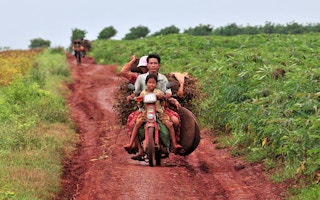While the basic science of climate change is settled, our scientific understanding of how climate is connected to food, agriculture, forests, and land is anything but. The 8th August publication of the next report from the scientists contributing to the Intergovernmental Panel on Climate Change (IPCC) Climate Change and Land, will explore these interconnections and provide clear signposts for how we can support the needs of nature and people in a changing climate.
We have known for years that the contribution made by our land choices—agriculture, deforestation, and land conversion—to climate change is enormous, accounting for nearly one quarter of total greenhouse gas emissions. Global warming, meanwhile, adds stress to land systems – driving higher temperatures and changing rainfall patterns, contributing to wildfires and tree mortality; stunting crop yields and helping disease and pests spread to new areas; and thawing permafrost, releasing yet more greenhouse gases. In short, land and climate change are inextricably linked, and this linkage is essential for people and livelihoods.
Further, these interconnections will only grow, as the risks posed to these systems accelerate considerably as warming exceeds 1.5°C, the goal set by the 2015 Paris Agreement, adding on top of existing stresses on our land systems from increasing consumption and unsustainable diets.
The timely new IPCC work should help point the way forward, showing that how we manage land and practice agriculture will be central to both mitigating and adapting to the looming climate emergency. Already, around one quarter of the commitments to reduce emissions made by governments through the Paris Agreement – set out in their Nationally Determined Contributions, or NDCs – involve land use, with forests playing a primary role.
We would go further. We know the potential for sustainable land management and nature-based solutions is enormous, not just for climate change mitigation efforts, but for people and nature too. These responses offer a way to help secure a climate safe future while also contributing to efforts to tackle the interconnected societal challenges of halting and reversing nature loss, combating land degradation and desertification, and delivering food security for a growing population.
“
The timely new IPCC work should help point the way forward, showing that how we manage land and practice agriculture will be central to both mitigating and adapting to the looming climate emergency.
Encouragingly, there is a whole suite of sustainable land management solutions that can help avert dangerous climate change while also contributing to adaptation and reducing food insecurity, desertification and land degradation.
The IPCC report should detail some of these “integrated response options”, showing the potential of win-win-win-win-wins from nature-based practices like enhancing soil carbon, agroforestry, and better managing our croplands, rangelands, and forestlands. Further, we expect that the report will echo previous ones that some of the strongest synergies will come from actions we all can take in our daily lives, like eating a more healthy, sustainable diet and reducing food waste. Such actions not only decrease emissions but also reduce pressure on natural habitats from food production.
Still, decisions around land are context-dependent and we know tradeoffs exist. Not all solutions are win-wins; some—such as growing crops for bioenergy on a massive scale, or extensive plantation forestry programmes – would threaten food security, biodiversity, and climate resilience and must be approached with caution.
A final key point the report is expected to make, however, is that action on land systems cannot take the place of the equally urgent action needed to reduce emissions from energy, industry, and urban systems. The IPCC previously termed these the four ‘system transitions’ we need to keep warming below 1.5°C, and they all must happen in tandem—meaning any efforts that reduce ambition in one transition by‘offsetting’ it to land systems must be avoided if we are to avoid even greater/deadlier impacts of the climate crisis.
The IPCC’s mandate strives for ‘policy relevance’ without making policy recommendations, but the science it sets out carries clear implications for decision makers. Specifically, solving the integrated challenges that Climate Change and Land will detail will require radical collaboration – such as bringing together local and national government, the private sector, land managers, NGOs and Indigenous communities to mainstream conversion free sourcing through sectoral, jurisdictional and landscape approaches.
It won’t be easy—such approaches will require overcoming substantial barriers and aligning incentives across these stakeholder groups—but it is clear that countries must better integrate land and nature when they revise and enhance their NDCs in line with the Paris Agreement. The UN Secretary General’s Climate Summit in September will be the first test of whether countries take the IPCC’s work to heart and help deliver the sustainable land future we need.
Dr Christopher Weber is the World Wildlife Fund’s Global Climate and Energy Lead Scientist. He has previously held roles at 2° Investing Initiative and the World Resources Institute, and has served as a consultant to the UNEP Finance Initiative. He has also consulted on corporate sustainability for several Fortune 500 companies.











